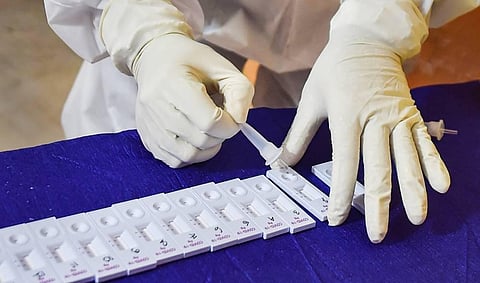

BHUBANESWAR: Researchers from CSIR-Institute of Genomics and Integrative Biology (IGIB), New Delhi and Institute of Medical Sciences and SUM Hospital, Bhubaneswar have found 73 new variants of Covid 19 strain by conducting the genome sequencing of 1,536 samples over a period of three months.
Interestingly, two new genetic lineages - B.1.112 and B.1.99 - were found for the first time in India. Though further extensive study is necessary, the lineages hint at new mutations of Covid-19 virus.
“There is a hint for new mutations from these two lineages. There are chances of getting new strains of the virus. But, we are still studying if these can be called mutations at all or whether it can affect the community and found in rest of the world,” Dr. Jayashankar Das, Lead Investigator and Director (Research) of IMS and SUM Hospital, said.
The researchers insisted that the newly-found variants should not be confused with mutations at this stage. “If these variants are subsequently found in different clusters or among more than one per cent of the population, then we consider it to be mutation. But, at this point we can only conclude that these are variants. Thus, no new strains of the virus with completely different characters have been found,” said Das.The variations in the genetic sequences may have been caused due to various factors including environmental or interaction with different host bodies, they explained.
The researchers are now studying the impact of these variants on human bodies. “At present, we can’t say what kind of impact these variations are causing on the humans. But, the presence of variants indicate that the virus is spreading fast,” added Das.
According to the researchers, the outcome of this study may help in conducting advanced hyper-senstitive tests to identify the specific variant present in a host’s body. If the variant is identified in the test results, the line of treatment and vaccine administration could be done in a more specified manner with increased efficiency. The existing RC-PCR tests are confirmatory tests only.
The team of researchers at SUM hospital is also studying the characteristics of 500 viral genomes to understand the causes leading to differences in symptoms, ranging from mild, moderate to critical among different patients.
The study aims to learn more about the transmission capabilities of the virus. Successful outcomes of the study may help researchers pave the path for genomic medicines to treat corona patients.With this study, India beat 12 organisations in 10 countries to complete the first field validation and released the data online, as per a report by Sequencing Giant tech Illumina.
“This is the first ever attempt in the world to have such a large scale detection, surveillance and genetic epidemiology of Covid-19 in a single run,” Das claimed.